[Dec 2007, Volume 4 Quarterly Issue] Pdf File size - The IIPM Think ...
[Dec 2007, Volume 4 Quarterly Issue] Pdf File size - The IIPM Think ...
[Dec 2007, Volume 4 Quarterly Issue] Pdf File size - The IIPM Think ...
Create successful ePaper yourself
Turn your PDF publications into a flip-book with our unique Google optimized e-Paper software.
REIMAGINING INDIA<br />
yet another Scot and identified with the<br />
Scottish Enlightenment, was articulate<br />
on the issue. In his An Essay on the History<br />
of Civil Society (1767), Fergusson<br />
wrote that, ‘It has been found, that, except<br />
in a few singular cases, the commercial<br />
and political arts have advanced<br />
together.’ 5 Fergusson maintained that<br />
the incidence of commerce was quiet<br />
engaged with the ways of nations and<br />
pointed out that, ‘In some nations the<br />
spirit of commerce, intent on securing<br />
its profits, has led the way to political<br />
wisdom’. 6 <strong>The</strong> point that was being made<br />
by Fergusson was received well and the<br />
text of the Essay on the History of Civil<br />
Society ‘found many enthusiastic readers<br />
in London, where it went through<br />
seven editions in Fergusson’s lifetime.’ 7<br />
It was an endorsement of the general acceptance<br />
of these thoughts and explanations<br />
about the working of the economy.<br />
<strong>The</strong> schools of German Philosophy<br />
tors who debated on a host of areas that<br />
were at once connected with the enquiries<br />
that Smith and Fergusson were working<br />
on. <strong>The</strong> transition was clearly visible<br />
and so much so that until the seventeenth<br />
century, the term economy did<br />
not quiet signify much and that university<br />
chairs were set up for studies in ethics<br />
and not that for economics. Smith<br />
himself was appointed as a professor of<br />
moral philosophy in 1752 and published<br />
<strong>The</strong> <strong>The</strong>ory of the Moral Sentiments in<br />
1759, years earlier to <strong>The</strong> Wealth of Nations<br />
which was published in 1776. <strong>The</strong><br />
transition was notable enough and<br />
It was reasoned that if the interests of these contending<br />
actors (Commercial class and State) were so intense, the<br />
resultant interactions could well be inimical to either of<br />
them and could therefore be a source of stress in the<br />
society. Hence, came the idea of civil society<br />
would also remain indebted to Fergusson<br />
for the term civil society, a term that<br />
would also be used here in connection<br />
with the market and the State.<br />
<strong>The</strong> contributions of Smith and Fergusson<br />
were important. <strong>The</strong>y helped<br />
recognize the reasons for commerce and<br />
further enabled recognition of an additional<br />
two domains that were relevant to<br />
matters of manufactories and commerce.<br />
<strong>The</strong>se were those of markets and that of<br />
States. <strong>The</strong>re were many more contribu-<br />
Watson points out that when Smith died<br />
‘after a life of intellectual adventure and<br />
social prudence’, a local newspaper complained<br />
in its obituary (4 August 1790)<br />
that he had ‘converted his chair of moral<br />
philosophy at Glasgow University into<br />
one of trade and finance’.’ 8 And while<br />
earlier in Britain ‘men argued that human<br />
nature rather than the state should<br />
govern economics’, matters changed<br />
course and the role of the state became<br />
clearer so much so that, ‘We should not<br />
forget that state intervention in the<br />
eighteenth century was very important<br />
to economic development and Smith<br />
never disagreed with this.’ 9 <strong>The</strong> debates<br />
initiated by thinkers such as Smith and<br />
Fergusson, among the many others, had<br />
initiated major long term changes. And<br />
if the stage was set for expansion of commercial<br />
trade and manufactories, their<br />
momentum was quiet clearly induced by<br />
debates that took place during these periods.<br />
Changes during the next period of<br />
the nineteenth century and those thereafter<br />
are testimony to the expansion that<br />
had been achieved by these nations.<br />
<strong>The</strong> Third Actor – Inclusion Of<br />
<strong>The</strong> Civil Society As Part Of<br />
<strong>The</strong> Triad<br />
<strong>The</strong> growth of these economies brought<br />
into sharp focus a number of developments<br />
that claimed for attention. <strong>The</strong><br />
rise of the commercial class with its<br />
members quiet clearly interested in their<br />
private interests and that of the State<br />
could expectedly raise the requirements<br />
of boundaries determining their spheres<br />
of operation. It was reasoned that if the<br />
interests of these contending actors were<br />
so intense, as it appeared to be, the resultant<br />
interactions could well be inimical<br />
to either of them and could therefore<br />
be a source of stress in the society. It is<br />
as an outcome of this concern that the<br />
idea of civil society came to be articulated.<br />
If the term civil society has been<br />
an old one, it is with John Locke (1632-<br />
1704), the Scottish Enlightenment<br />
group, and Georg Hegel (1770-1831) that<br />
the term came to be positioned more<br />
firmly and done so in the contextual format<br />
that includes the State and the market.<br />
Seligman observes that ‘what stood<br />
26 THE <strong>IIPM</strong> THINK TANK


![[Dec 2007, Volume 4 Quarterly Issue] Pdf File size - The IIPM Think ...](https://img.yumpu.com/29766298/25/500x640/dec-2007-volume-4-quarterly-issue-pdf-file-size-the-iipm-think-.jpg)
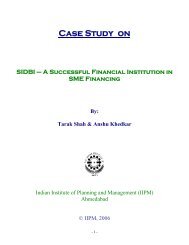
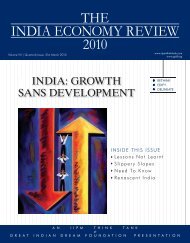
![[Feb 2008, Volume V Annual Issue] Pdf File size - The IIPM Think Tank](https://img.yumpu.com/43961117/1/190x245/feb-2008-volume-v-annual-issue-pdf-file-size-the-iipm-think-tank.jpg?quality=85)
![[June 2008, Volume V Quarterly Issue] Pdf File size - The IIPM Think ...](https://img.yumpu.com/41693247/1/190x245/june-2008-volume-v-quarterly-issue-pdf-file-size-the-iipm-think-.jpg?quality=85)
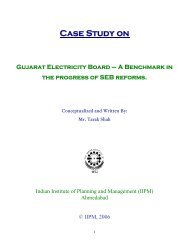
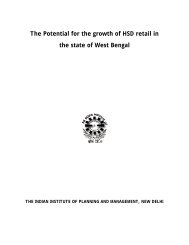
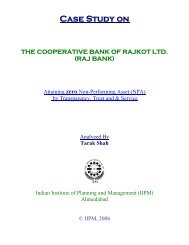
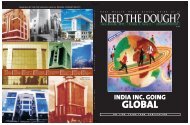
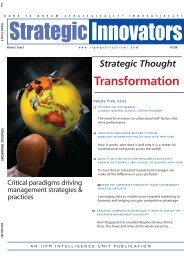
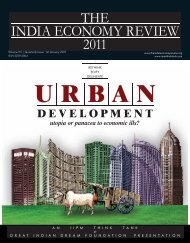
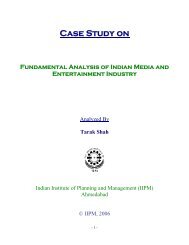
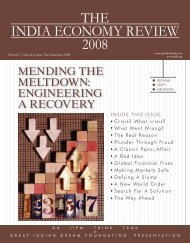
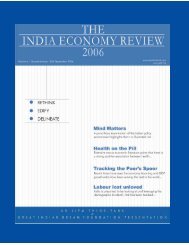
![[Volume VI | Quarterly Issue: 31st May 2009] Pdf File size](https://img.yumpu.com/27796051/1/190x245/volume-vi-quarterly-issue-31st-may-2009-pdf-file-size.jpg?quality=85)